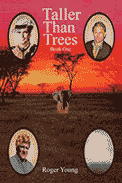
 |
Corporal Willoughby is summarily ordered by higher-ups to leave his Town Police job in Bulawayo, Southern Rhodesia in September of 1913. He is to pursue the McKinley brothers, wanted for robbery and murder, and one Jan Van Rooyen, a Dutch poacher of elephant tusks and smuggler of gold. Willoughby’s patrol into the bush after these men lead to his crossing over into South Africa to kill the McKinleys, befriend and let go Van Rooyen, shooting a lion, and saving a naked girl from a crocodile attack. All these and other seemingly justifiable police actions get Willoughby in big trouble with the brass. An impromptu labor dispute settlement by Willoughby is another cause for censure and he is eventually exiled to Queenstown, a notorious hot-bed of corruption and crime just to the north of Bulawayo.
This is a big, sprawling tale of close to seven hundred pages that are filled with beautiful and evocative descriptions of South African scenery. The author clearly loves the land and people. His detailed descriptions of Zulu history and the Matabele tribe are wonderful. The characters are drawn larger than life, the plot moving fast for the first 400 pages The Queenstown chapters form the last half of the book and are the author’s chance to argue for his Common Law versus Statutory Law ideas. He has Willoughby formulate a “No Force, No Fraud” policy and let the unregulated and unlicensed vendors of goods licit and illicit carry on unimpeded. He repeatedly takes aim at government, regulations, even democracy. Common law and laissez faire capitalism are championed. This sudden change in tone is a little jarring, bordering as it does on polemic. The poetic language of the first half outweighs the abrupt shift into social theorizing in the second, however. This is a unique historical novel.
RECOMMENDED by the US Review